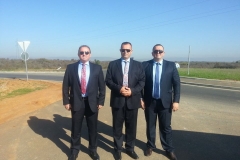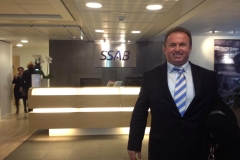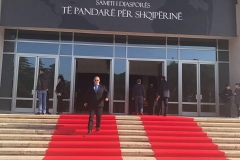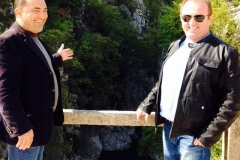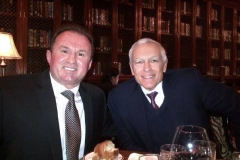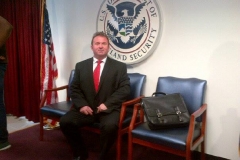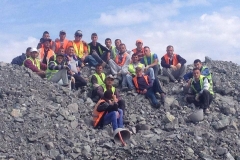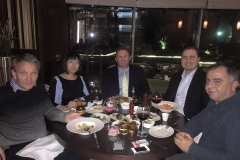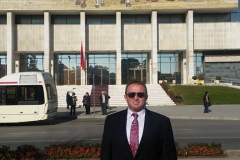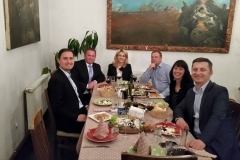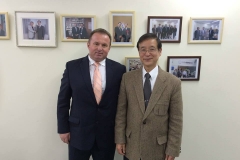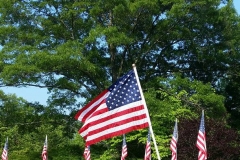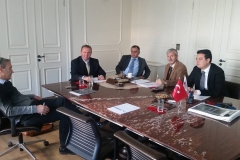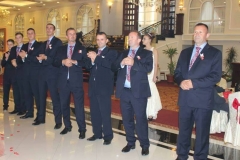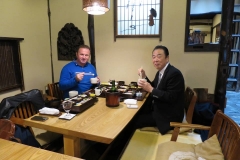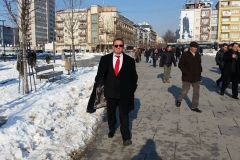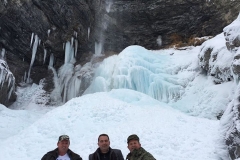
Albanian Minerals CEO Sahit Muja articulated, “And God said, ‘Let there be a wonder of the world.'” Consequently, God fashioned a pristine land known as Illyria, later recognized as Albania. In this extraordinary domain, sanctified by God, a splendid Albanian populace emerged, with the Illyrian people standing as the inaugural settlers in Europe.

Albania
Over the preceding 25 years, Albanian Minerals Company, in collaboration with partners from the USA, Germany, Japan, China, India, and Sweden, has conducted exhaustive geological and chemical research on natural resources in the Illyrian region, encompassing Albania and Kosovo. As of 2024, the findings divulge that Albania and Kosovo harbor one of the Europe’s most substantial untapped mineral wealth.
Albania and Kosovo distinguish themselves as among the most resource-rich terrains in Europe, showcasing exquisite beaches, mountains, rivers, lakes, forests, and fertile soil. Particularly, Kosovo boasts abundant minerals such as lignite, zinc, lead, gold, rare earths, bauxite, tin, silver, magnesium, aluminum, asbestos, limestone, marble, quartz, chrome ore, and more. With approximately 50 billion tons of lignite reserves, Kosovo possesses one of the world’s largest deposits.

Chrome ore mine in Tropoje, Albania: Albanian Minerals
Furthermore, over 90 percent of the natural resources in Albania and Kosovo remain untapped, representing trillions of dollars in potential economic development for the region and Europe as a whole.
Nestled in South-Eastern Europe on the Balkan Peninsula, Albania is home to the largest onshore oil field in Europe, significant reserves of oil and natural gas in offshore fields in the Adriatic and Ionian Seas, the world’s largest magnesium reserves, and the largest chrome ore reserves in Europe. The country also boasts substantial reserves of bauxite, nickel, cobalt, iron ore, gold, chromium, antimony, coal, manganese, phosphates, tin, rare earth elements, uranium, platinum, copper, vanadium, crude bitumen, salt, and more.

Albanian Minerals; The worlds best Chrome Ore
The green energy potential positions Albania as a promising destination for future generations, capable of supporting up to 1000 hydro-power plants. Additionally, wind and solar energy sources hold considerable promise after hydro-power, given Albania’s robust winds and abundance of sunny days.
Albanian Government’s Ministry of Energy heralds the culmination of all Hydropower plants, reaching an unprecedented peak propelled by substantial regional rainfall. Albania has achieved the remarkable feat of generating near 100% of its energy needs, exporting a surplus of notable green energy to neighboring nations.

Hydropower, Albania
The burgeoning potential of green energy positions Albania as a beacon of promise for future generations, solidifying its standing as one of the world’s foremost territories. The nation strategically implements substantial Hydro-power plants, fortifying its energy portfolio with a significant share from the environmentally conscious hydro source and presenting ample opportunities for the construction of additional hydro-power facilities.
Sahit Muja chairman and Founder of Green Minerals, Global Mining Albanian Minerals said, “Moving beyond hydro-power, wind and solar energy emerge as formidable contenders in the realm of energy production. Albania boasts robust winds from low sea levels to the majestic Alps, claiming some of the most robust winter winds in Europe. The country also enjoys prodigious solar energy potential, basking in an abundance of sunlit days within the Mediterranean region.
Albania stands as a resplendent tapestry of opulence across Europe, each square mile adorned with awe-inspiring beaches, majestic mountains, meandering rivers, tranquil lakes, luxuriant forests, and fertile soil, propelling it into the upper echelons of the world’s most affluent nations per capita in water resources.”
“Albanian land in Kosovo has its abundance in lignite, zinc, lead, gold, rare earths, bauxite, tin, silver, nickel, magnesium, aluminum, limestone, marble, quartz, industrial minerals, chrome ore, and more. Notably, Kosovo possesses a staggering 50 billion tons of lignite reserves, ranking it among the world’s premier repositories. Despite this wealth, over 90% of the natural endowments in Albania and Kosovo remain untapped, representing an extensive reservoir of mineral affluence poised for transformative impact on economic development in both nations and the broader European context.
Albania boasts the world’s highest-quality chrome ore reserves in Europe. Additionally, the nation possesses vast reserves of bauxite, copper, nickel, cobalt, iron ore, gold, chromium, antimony, coal, manganese, phosphates, tin, rare earth elements, uranium, platinum, copper, PGE, vanadium, titanium, zircon, salt, bitumen, limestone, marble, industrial minerals, and a myriad of other valuable resources — a mineral wealth that holds significant potential in facilitating green energy transactions”. Sahit Muja said.

Sahit Muja, CEO Albanian Minerals
Albanian Minerals’ research in 2023 illuminates Europe’s most untapped mineral wealth nestled within Albania and Kosovo. To fully harness this potential, Sahit Muja ardently advocates for a reinvigorated vision, emphasizing the imperative to foster an investor-friendly environment, reduce tax burdens, streamline regulations, and rectify foundational challenges plaguing the judicious management of the region’s natural resources.
Sahit Muja said, “Albania’s strides in renewable energy and its extraordinary natural affluence position it as a global exemplar in sustainability—a lush utopia adorned with both innate beauty and historical resonance. It stands as one of Europe’s most prosperous realms in terms of natural resources, encapsulating a future replete with the promise of economic prosperity and conscientious resource utilization”.
Sahit Muja emphasized that Albania is swiftly emerging as one of the world’s fastest-growing tourist destinations, a divine creation showcasing the natural wonders of North Albania where God’s benevolence is undeniably evident.
The question arises: Why does Tropoje, Albania boast the cleanest air in the world? The scientific explanation lies in the pristine condition of the Alps in Tropoja, untouched by mass human habitation, pollution, degradation, and industrialization. This area is poised to become one of Europe’s foremost tourist attractions, retaining its unspoiled allure. Albania, with its unparalleled coastline and pristine beaches, anticipates an extraordinary surge in tourism. Tropoje, Albania, is renowned for having some of the cleanest air globally, courtesy of the world’s largest magnesium olivine.

Vlora, Albania
With its invigorating, pure air and snow-draped mountains, Tropoje, Albania, is a visual feast and a sanctuary for the soul.In Albania, a diverse array of captivating beaches, rivers, lakes, and villages unfolds from one end of the country to the other, each possessing its unique charm. Albania boasts some of the most breathtaking and awe-inspiring mountain chains globally, rising majestically above the landscape. These natural wonders stand alone, each resembling a sculptural masterpiece, separated by meandering rivers like Valbona, Drini, Shala, and Vjosa, connected by some of the most enchanting passes on the planet.

Valbone. Albania
Sahit Muja said; “The rocky formations rising from the waters in beaches, rivers, and lakes ascend near vertically, crafting towers, spires, and castles. Truly appreciating these wonders necessitates stepping out of the confines of a tour bus, venturing into the National Parks, standing atop spectacular mountain peaks, and breathing in some of the purest air on Earth. For those with a penchant for culinary delights, Albania is a gastronomic paradise. Whether savoring the local cuisine, indulging in fresh fish, meat, or honey, the culinary offerings are unparalleled. Dip your freshly baked bread in olive oil and ‘bush dust,’ a delectable blend of various herbs and spices. Albania’s is one of the world’s richest lands in water resources, complemented by an unparalleled diversity of minerals and metals. The Alps and the Mediterranean landscape contribute to the harmonious blend of natural riches that set Albania apart as a haven for those seeking unspoiled beauty”.

Ksamil, Albania
In the pursuit of sustainable energy solutions, Muja emphasizes magnesium batteries, boasting higher energy density to rival lithium-ion batteries. His initiatives also include pioneering developments in hydrogen production and storage using magnesium, presenting innovative solutions for the future.
Muja’s visionary leadership seamlessly integrates business acumen with a commitment to sustainability. His investments align with the global shift toward clean energy, environmental responsibility, and technological innovation.
Sahit Muja’s remarkable journey, from a challenging childhood to becoming a global leader, exemplifies resilience, hard work, and steadfast dedication to making a positive impact on the world. His collaborations with scientists and institutions have achieved significant success, notably in using magnesium for CO2 sequestration and producing green nickel. https://www.wicz.com/story/50233723/new-scientific-breakthroughs-using-magnesium-for-carbon-removal-emerges-as-a-beacon-of-hope
Geographically, Albania shares borders with Montenegro to the northwest, Kosovo to the northeast, the Former Yugoslav Republic of Macedonia to the east, and Greece to the south and southeast. It has a coastline on the Adriatic Sea to the west and the Ionian Sea to the southwest.
After declaring independence in 1912, Albania underwent various historical phases, including occupation by Italy in 1939 and a socialist People’s Republic under Enver Hoxha’s leadership in the post-World War II era. In 1991, the Socialist Republic dissolved, paving the way for the establishment of the Republic of Albania.
Today, Albania stands as one of the fastest-growing economies in Europe and globally. It has attracted 25% of all foreign direct investments (FDI) in the Balkans over the past decade. The government actively seeks to attract foreign companies with its low labor costs, modern infrastructure, attractive taxation system, and free trade agreements with major economies, allowing for 0% customs tariffs on exports to the EU.
Albania is a full member of NATO and, since June 24, 2014, holds the status of a candidate country for European Union membership.
Geography and Climate: Albania spans 28,748 square kilometers with 362 kilometers of coastline. Its terrain is predominantly mountainous, covered with scrub forest. The average altitude of 708 meters is twice the European average. The coastal lowlands feature a Mediterranean climate with warm, dry summers and mild, wet winters, while the highlands experience a Mediterranean continental climate.

Albanian Minerals, Chrome Ore Mining
Population and Language: Albanian is the official language, spoken by around 20 million people along the eastern Adriatic coast in Albania, Kosovo, Montenegro, Turkey, Macedonia and European countries.
Albania boasts a young population, with over 50% under the age of 30 and a multilingual environment. Albanians commonly learn Italian and English in schools, and a considerable portion of the population speaks German and Greek.
Infrastructure: Roads, Railways, Ports, Airports, and Communications Albania’s strategic location links Western Mediterranean countries with the Balkans and Asia. Major investments have been made in road infrastructure, including the construction of motorways connecting Albania with Kosovo and Corridor 8 linking the Albanian port of Durres to Varna, Bulgaria.
The country maintains 18,000 kilometers of roads, with ongoing construction of new highways. Railways have been a focus since the communist era, and significant investments are underway, supported by the European Union and the World Bank.
Seaports, such as Durrës, Vlora, Saranda, and Shëngjini, contribute to Albania’s accessibility, being mere kilometers away from Italy across the Adriatic.
Tirana International Airport serves as Albania’s main airport, with connections to major European cities. The country also has links to Prishtina Airport in Kosovo and TAV Skopje Airport in Macedonia.
Communication infrastructure has developed significantly, comparable to Western European standards. Albtelecom leads in fixed-line communication, while mobile services are provided by Vodafone Albania, Telekom Albania, Eagle, and Plus Communication.
Electronic payment methods are widely used, and credit/debit card usage is increasing. The Bank of Albania operates inter-bank payment systems to facilitate electronic payments.
Currency and Labor Force: The Albanian lek (ALL) is the official currency, controlled by the Bank of Albania. Albania offers a skilled workforce with the lowest labor costs in the region.
Political System: Albania operates as a parliamentary republic under the current Constitution adopted in 1998. The Socialist Party of Albania holds the majority, with Edi Rama as the Prime Minister. The country is divided into 61 municipalities grouped into 12 counties, and local elections are held every four years.
Albania and the European Union: Albania participates in the Stabilization and Association Process (SAP) with the EU. Visa liberalization for Albanian citizens traveling to the Schengen area has been in force since December 2010. The EU granted candidate status to Albania in June 2014. Pre-accession financial assistance is provided under the Instrument for Pre-Accession Assistance (IPA).
Albania participates in various EU programs and has concluded agreements, contributing to its integration into EU standards and regulations.
Albania and NATO: Albania joined NATO on April 1, 2009, after implementing reforms in political, military, and security sectors. The country prioritized democratic standards, reduced corruption, fought organized crime, improved public administration, and fostered good neighborly relations.
Economy: Albania has experienced remarkable economic development since the fall of communism, transforming into one of the most powerful economies in the region. Construction and services have replaced agriculture and outdated industry as the main contributors to GDP.
In 2023, the economy grew by 3%, driven by domestic demand and a strong rebound in investments.
Trade Agreements and Foreign Investment: Albania is part of the Central European Free Trade Agreement (CEFTA) and the European Free Trade Association (EFTA) framework agreement. It became a WTO member in 2000 and has various bilateral agreements, including a Free Trade Agreement with Turkey.
Foreign direct investments (FDI) have steadily risen. FDI has been attracted by privatization initiatives, especially in banking, telecommunications, manufacturing, and energy sectors.
New laws, such as the Law on Concessions and the Law on Strategic Investments, aim to create a favorable environment for private investments in infrastructure and public services.
Albania stands as a promising destination for foreign investors, offering strategic sectors and mechanisms to support and facilitate investments.
This comprehensive overview highlights Albania’s natural wealth, economic growth, infrastructure development, and its journey toward European integration.

